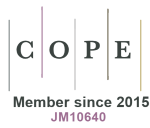Most read articles by the same author(s)
- Safinur Atay, Carolyn D. Roberson, Cicek Gercel-Taylor, Douglas D. Taylor, Ovarian Cancer-Derived Exosomal Fibronectin Induces Pro-Inflammatory IL-1β , Journal of Circulating Biomarkers: Vol. 1 No. 1 (2013): January-December 2013









